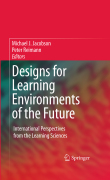
Designs for learning environments of the future: international learning sciences theory and research perspectives
Jacobson, M.J.
Designs for Learning Environments of the Future presents current research by leading scientists around the world who are exploring the design of technologies that may form the foundations of learning environments of the future. In a field that changes as quickly as technology does, it is necessary that a book like this provides a representative survey of the wide range of types of advanced learning technologies that are currently being explored at leading research groups around the world—such as multi-user virtual environments, 2D and 3D modeling systems, intelligent pedagogical agents, and collaboration tools for synchronous and asynchronous learner interactions. The importance of basing thedesign features of these technological tools and environments on the most current theoretical and research based perspectives into how students learn is also stressed. Provides a representative survey of the wide range of types of advanced learning technologies Internationally recognized authors known for their innovative approaches for designing and using technologies that support learner centered pedagogy Discusses a variety of theories and research principles INDICE: From the contents MaterialSim: A Constructionist Learning Environment for Materials Science and Engineering Using Multi-Agent Simulation.- Adopting and Improving a Community of Software Advisors: Enabling Young Learners toDevelop and Enhance Core Capabilities.- From Computer-Based Manipulatives to Hypermodels.- Scaling Up SimCalc: Accelerating Student Engagement in ImportantMathematics via Curriculum and Connectivity.- Learning Mathematics Through Inquiry by Integrating Computer Simulation Usage Within Regular Instruction.- Designed Collaboration for College students’ schema Formation in the Domain of Cognitive Science.- Distinctive Characteristics of Knowledge Building Environments.- The Development of a River City: A Scientific Inquiry Curriculum in a Multi-User Virtual Environment.- Intelligent Agent-Enhanced Multi-User Virtual Environments: Technology, Curriculum, and Cultural Design and Learning SciencesResearch Issues.
- ISBN: 978-0-387-88278-9
- Editorial: Springer
- Encuadernacion: Cartoné
- Páginas: 390
- Fecha Publicación: 01/04/2009
- Nº Volúmenes: 1
- Idioma: Inglés
